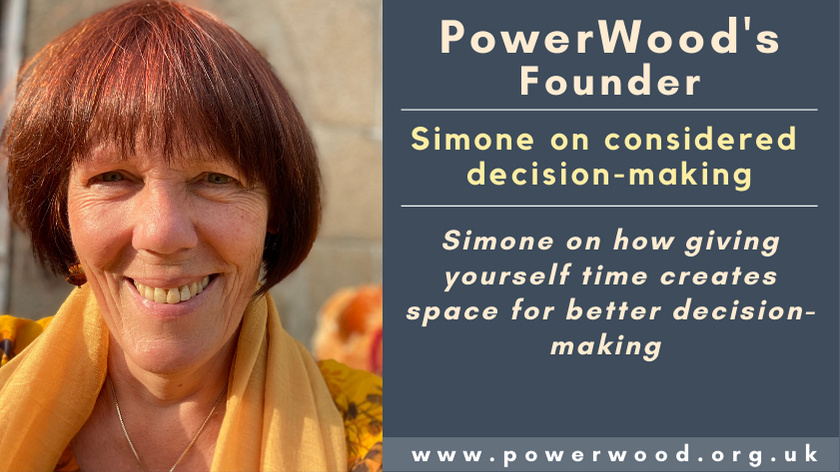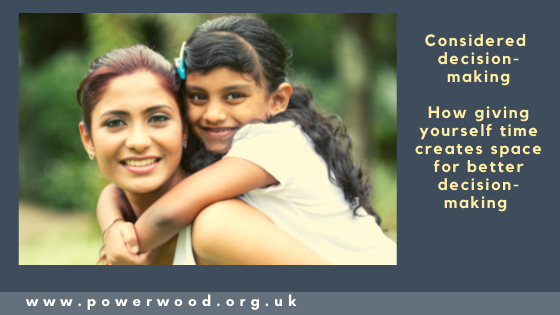
Every time our child asks us for something, we have to make the decision to say yes or no.
If you don’t feel in a good place, never feel obliged to react in the moment. Bear in mind, too, that our children are often aware of when we are under strain and can use these moments to target us because they know they have a bigger chance of getting their way.
Be clear only if you are able to be, and by ‘able’ I mean ‘do you have the emotional resilience and the energy to cope with the emotional response of your children at this moment?’ If there is a risk that you may make an unfavourable decision, or if you don’t have the energy to think through the consequences of this situation, then it is best to delay the decision.
Have a standard sentence available for such occasions e.g. “Interesting question, I’ll write it down and think about it,” and write it on a sticky note. Don’t let yourself be persuaded to talk about it. Just repeat every time they go back to it in a kind voice “I’m sorry I haven’t thought about it yet”. Don’t make any promises about when you’re going to think about it or give a decision.
If we feel we have to stand up for our norms and values NOW, ask yourself if it is maybe being fuelled by a stress-response. Will it really help the situation and calm everyone involved or is it likely to be a step towards an escalation that you would like to prevent from happening.
We rarely have to stand up for our norms and values when we are not rested, fed and relaxed. Sometimes it’s more helpful to ignore not helpful behaviour, pretend we don’t notice if we can do so safely, to prevent further escalation. Siblings often play out differences in a more pronounced way if they have the attention of a parent.
We want to have the freedom to decide when to talk about it. We want to go there when both we and our child feel rested, well fed and we feel we are emotionally resilient enough to not become emotionally invested in the behaviour of our children. To wait for a few days might be a great experience for children as it will prepare them for real life.
Put the sticky note on a place, maybe in our PowerBook, where it reminds us and not our child.
It is important to get back to them so they learn we are reliable and they can build on the fact that if they come to us with something we will seriously consider it and get back to them about it without being poked or reminded.
Shopping together
When our children are accompanying us to the shop they will often see something that takes their fancy. And of course they will ask if they can have it.
Feel free to say to them: “I’ll think about it, I’ll let you know when we are at the till.”
If our children are nagging us about what they want to have, after we have let them know that we are thinking about it you can say something like, “If you keep on talking about it, it’s going to be a ‘no’. I’ll let you know at the till.”
This way you are sure you are not going to react in a stress response whether it’s fawning or fighting, because you are buying yourself some time to think. On top of that our children are training to postpone their gratification, which is an important skill.

Saying yes or no
I discovered along the journey of parenting, that many of my ‘yes’s’ and ‘no’s’ were informed by the parenting of my own parents and by what I thought was socially acceptable, especially when I was stressed.
For example
In the Netherlands we normally have ‘oliebollen’ for New Year’s Eve, this is a type of home-made deep-fried donut often filled with fruit. My husband would normally make them a few days before New Year’s Eve together with the children, and then we would share them on New Year’s Eve with our neighbours and friends. I should add that while oliebollen are delicious the process of making them is messy and time consuming.
One hot summer our children, who were nine and eight, asked us if they could make oliebollen.
If I hadn’t been in the habit of postponing decisions, thinking it through and talking about it with my husband and then getting back to my children, I would instantly have said no – it wasn’t the right time of year and it would make a lot of mess (just like my mum would have responded). It felt counterintuitive, like going around houses singing carols in the summer, nobody would do that.
My husband and I talked it through and asked ourselves, why not – acknowledging our judgement that we thought baking oliebollen in summer was crazy, and asking ourselves what is there to lose, it might add something special to the summer. With the help of their dad they made great- oliebollen, which tasted utterly special and different. The children were really proud of themselves and we had lots of fun while eating them with the family in the sunny garden.
At the time we were taking part in a research and the researcher was staying with us for a few days and once she heard about this story she called her thesis “‘Oliebollen in the Summer” illustrating how abnormal it is in the Netherlands to have them in the summer.
It’s really worthwhile to think carefully about anything we want to say a direct ‘no’ or ‘yes’ to before we speak out. This isn’t only because of the consequences but also to give ourselves time to explore if it’s really important in the current situation to say ‘no’ or ‘yes’, and what would happen if we said the opposite to the way we might reactively be inclined to answer.
This pause gives us time to critically ask ourselves, is the answer I am inclined to give to this question based on my norms and values, or is it being informed subconsciously and through the lens of a stress response? When we consider that we might be 98% governed by our subconscious according to cognitive neuroscientist Michael Gazzaniga Ph.D. (2011), the value of taking time to allow the conscious thinking part of our brain to step in is clear. If we have a partner who is open to this, these are really interesting conversations to have together. Or we can talk to a good friend who knows us well.
Taking time to consider also helps us raise awareness about how we are defined by our stress responses and not helpful childhood dynamics, and repetition will remind us of our inability to make a choice when triggered. Practising this over time will also increase our ability to bring about change and be more true to our own norms and values.
© 2021 Simone de Hoogh, senior consultant and founder of PowerWood.
- Gazzaniga, Michael S. (2011). Who’s in Charge?: Free Will and the Science of the Brain (1st ed.). New York, NY: Ecco. ISBN 978-0-06-190610-7.
Help us to continue support to all neurodiverse families and individuals
PowerWood offers to neurodiverse families understanding, simple tools and strategies that enable us to support ourselves and our children through emotional overwhelm. If you enjoy reading the articles please support PowerWood making all information available to all by becoming a PowerWood Community FreeBee or Friend member. Thank YOU!

